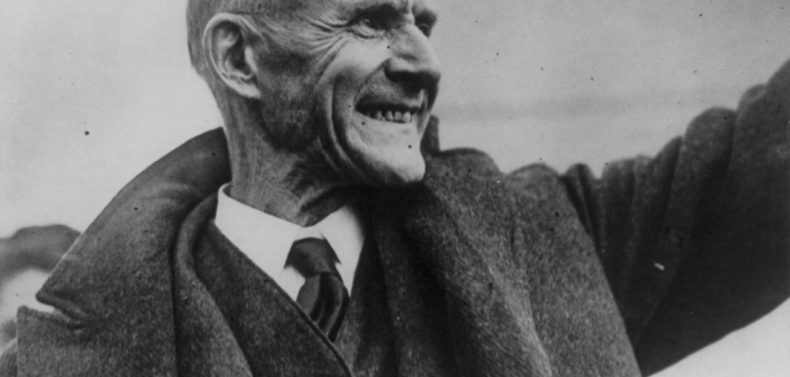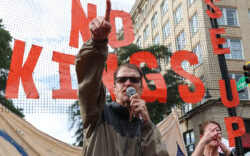“Socialism” is a word often bandied about today by politicians, pundits and preachers who wouldn’t know a socialist from a socialite. This nation that began with its original sins of warfare against Native Americans and slavery for Black people also has a long and glorious legacy of positive reforms that have benefitted all Americans. Many of the battles for racial, social and economic justice that were waged in United States history were led by socialists and other American activists, and this month of November is filled with people and events that are part of what historian Howard Zinn called “radical history.”
Saintly socialist Eugene Victor Debs was born in Terre Haute, IN, on Nov. 5, 1855. His long political odyssey took him from state representative to labor union leader to five-time candidate for president under the Socialist Party banner. Debs went to jail for his beliefs during the Pullman Strike of 1895 and again in 1918 for giving a speech opposing World War I. In that 1918 speech in Canton, OH, Debs thundered words that still apply today: “In every age it has been the tyrant, the oppressor and the exploiter who has wrapped himself in the cloak of patriotism or religion—or both—to deceive and overawe the people.”
Debs was given a 10-year prison sentence for his anti-war speech. He waged his last presidential campaign from a jail cell, garnering nearly a million votes in the 1920 election with his slogan “For President: Convict No. 9653.” President Woodrow Wilson called Debs a traitor and refused to mitigate his sentence. After Democrat Wilson left the presidency, his Republican successor, Warren Harding, commuted the activist’s sentence, and Debs left Atlanta Federal Prison. Hundreds of convicts cheered when Debs walked free, and thousands of people joined in a raucous celebration when Debs returned back home again to Indiana just in time to celebrate Christmas in 1921. President Harding invited Debs to the White House after his release. The Republican and the Socialist had a cordial conversation, but the only thing they told the press was that they both liked Western “shoot ‘em up” movies starring Hollywood cowboy hero Tom Mix.
Debs died at 70 in 1926, his health ravaged by his years in prison. Historian Zinn praised Debs as “fierce in his convictions, kind and compassionate in his personal relations.” His life and legacy live on in books like Democracy’s Prisoner by Ernest Freeberg, and Debs probably would smile at the fact that two contemporary beers, Debs Red Ale and Revolution Eugene, are named for him.
Debs was born in November and was influenced by events that made American radical history during this month. On Nov. 11, 1887, four radical labor activists were executed in Chicago following deadly clashes between police and protesters in the city’s Haymarket district. When Debs left prison, he visited their Haymarket Martyrs memorial at Chicago’s Waldheim Cemetery.
On Nov. 23, 1887, days after the Chicago executions, dozens of striking African-American sugar cane workers were killed by state militia members and white vigilantes in Thibodaux, LA. On Nov. 19, 1915, activist songwriter and accused murderer Joe Hill was executed in Utah. During the Everett Massacre in Washington state on Nov. 5, 1916, five union men were killed by cops and vigilantes. On Nov. 11, 1919, a mob led by American Legion members attacked an Industrial Workers of the World union hall in Centralia, WA. The mob lynched Wesley Everest, a union man and World War I veteran who said, “I fought for democracy in France, and I’ll fight for it here.”
In 1917, radical poet and artist Ralph Chaplin memorialized those who fought and died during this month in history: “Red November, Black November, bleak November, black and red/Hallowed month of labor’s martyrs,/Labor’s heroes, labor’s dead.”
Like what you just read? Support Flagpole by making a donation today. Every dollar you give helps fund our ongoing mission to provide Athens with quality, independent journalism.









